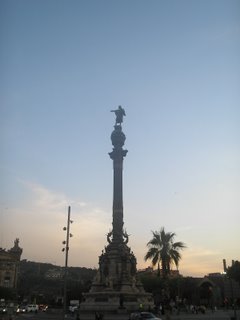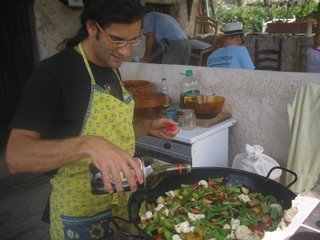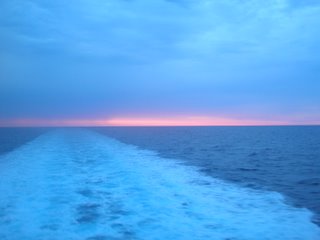Modern Gaia: Maximum Yield, Minimum Impact
I arrived on the island of Ibiza May 26th and have since been working at Casita Verde, a volunteer-run organic farm/ecology center. Never have I seen a more environmentally sensitive system of living and articulating the drive and soul of the place has been somewhat of a challenge.
Every solar photon is captured and converted into electricity; the same with each gust from the sea. Rain water is collected and distributed through an incredibly efficient system of recycling and irrigation. Ninety-nine percent of the waste that Casita Verde produces is applied to some form of beneficial and sustainable advantage. The food scraps are composted, the plastic paper and metal recycled, even the human waste itself is returned to fertile soil. And amongst this harmonious existence with nature, high speed wireless internet is broadcast over the valley. Pure and restorative meals that the most expensive restaurants in the world fail to rival in authenticity, with all ingredients all deriving from the island, feed and rejuvenate the workers and staff. Fifteen minutes down the road, the biggest night club in the world (capacity around 10,000) parties until dawn every night of the week. Is this an exception to Man’s inherent urge for modern progress and simultaneous decay? Perhaps. Or maybe this place, the product of one man’s fifteen years of genius and toil as well as the work of hundreds of volunteers from around the world, is a model of inspiration. How can the most advanced creature the Earth has ever nurtured satisfy both our varying and diverse modern conditioning as well as the necessity of preserving the only habitat we’ll get a shot at? At least part of the answer, I have found, lies on a little farm on an island called Ibiza.
Every solar photon is captured and converted into electricity; the same with each gust from the sea. Rain water is collected and distributed through an incredibly efficient system of recycling and irrigation. Ninety-nine percent of the waste that Casita Verde produces is applied to some form of beneficial and sustainable advantage. The food scraps are composted, the plastic paper and metal recycled, even the human waste itself is returned to fertile soil. And amongst this harmonious existence with nature, high speed wireless internet is broadcast over the valley. Pure and restorative meals that the most expensive restaurants in the world fail to rival in authenticity, with all ingredients all deriving from the island, feed and rejuvenate the workers and staff. Fifteen minutes down the road, the biggest night club in the world (capacity around 10,000) parties until dawn every night of the week. Is this an exception to Man’s inherent urge for modern progress and simultaneous decay? Perhaps. Or maybe this place, the product of one man’s fifteen years of genius and toil as well as the work of hundreds of volunteers from around the world, is a model of inspiration. How can the most advanced creature the Earth has ever nurtured satisfy both our varying and diverse modern conditioning as well as the necessity of preserving the only habitat we’ll get a shot at? At least part of the answer, I have found, lies on a little farm on an island called Ibiza.
 This is Chris Dews, the creator and driving force behind Casita Verde. Somewhat of a mad scientist and jack of all trades, Chris has been developing the systems at Casita Verde since 1991. He is standing in front of the eco toilet, one of the many systems I hope to cover in the next week or so.
This is Chris Dews, the creator and driving force behind Casita Verde. Somewhat of a mad scientist and jack of all trades, Chris has been developing the systems at Casita Verde since 1991. He is standing in front of the eco toilet, one of the many systems I hope to cover in the next week or so. I chose to travel the "greenest" way possible, which was a lovely nine hour boat ride from Barcelona. Above is a statue of Christopher Colombus. It is often noted that the statue is inaccurate for he is not poitning west to the new world, but instead south-east, towards Ibiza.
I chose to travel the "greenest" way possible, which was a lovely nine hour boat ride from Barcelona. Above is a statue of Christopher Colombus. It is often noted that the statue is inaccurate for he is not poitning west to the new world, but instead south-east, towards Ibiza. My accomodation and en suite chill out for my three weeks at Casita Verde. Made completely from recycled or natural materials, mainly bamboo and palm leaves.
My accomodation and en suite chill out for my three weeks at Casita Verde. Made completely from recycled or natural materials, mainly bamboo and palm leaves.
Just looks like a tree right? It's actually my neighbor, la casa del arbol, also completely made from recycled materials.
 Every Sunday Casita Verde opens its doors to about seventy locals and tourists for lunch. The money generated keeps the farm running from week to week. This David, a French culinary master helping out last week.
Every Sunday Casita Verde opens its doors to about seventy locals and tourists for lunch. The money generated keeps the farm running from week to week. This David, a French culinary master helping out last week.
Ibiza is known for its glitzy clubs, but the sub-culture is quite health yas well. Last week we went to Benirass beach for a drum circle sunset.

The history here is quite dynamic as well. Carthage, the Romans, the Moors, Catalans, take your pick, Ibiza played a crucial role for all.
Five hours of labor a day in exchange for room and three meals a day in the middle of paradise is the basic equation. A lot of people have been asking me what the story of this place is, and I'm still kind of working it out myself.


0 Comments:
Post a Comment
<< Home